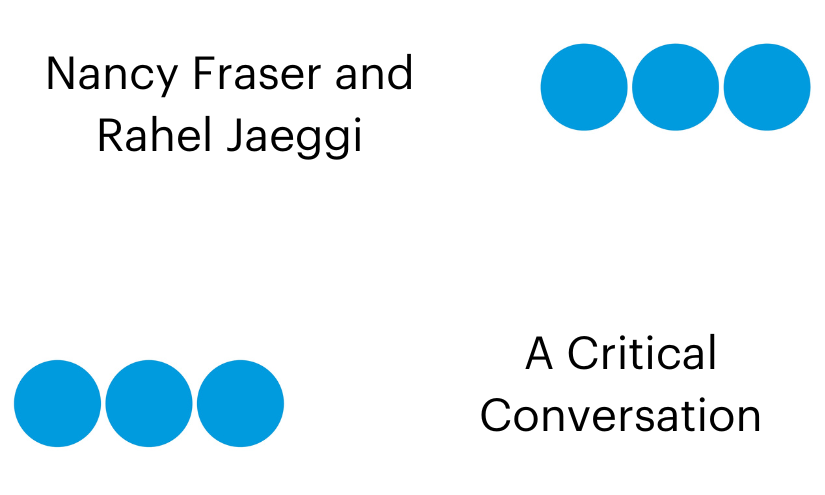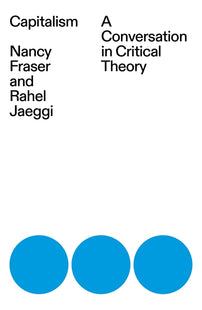From production to reproduction
Nancy Fraser and Rahel Jaeggi take a broad view of the sites where social reproduction is located in capitalist society.

Fraser: The first is the shift, theorized by Marxist- and socialist- feminists, from commodity production to social reproduction. What are at issue here are the forms of provisioning, caregiving, and interacting that produce and maintain social bonds. Variously called “care,” “affective labor,” or “subjectivation,” this activity forms capitalism’s human subjects, sustaining them as embodied, natural beings, while also constituting them as social beings, forming their habitus and the socio-ethical substance (Sittlichkeit) in which they move. Central here is the work of socializing the young, building communities, and producing and reproducing the shared meanings, affective dispositions, and horizons of value that underpin social cooperation, including the forms of cooperation-cum-domination that characterize commodity production. In capitalist societies, much (though not all) of this activity goes on outside the market – in households, neighborhoods, civil society associations, and a host of public institutions, including schools, childcare and eldercare centers; and much of it does not take the form of wage labor. Yet social reproductive activity is absolutely necessary to the existence of waged work, to the accumulation of surplus value, and to the functioning of capitalism as such. Wage labor could neither exist nor be exploited, after all, in the absence of housework, child-raising, schooling, affective care, and a host of other activities that produce new generations of workers, replenish existing generations, and maintain social bonds and shared understandings. Much like “original accumulation,” therefore, social reproduction is an indispensable background condition for the possibility of capitalist production.
Jaeggi: This is a familiar theme in Marxist-feminist theory – that the reproduction of wage labor in the factory depends on and is subsidized by unwaged labor in the household. How would you position yourself in relation to the work of Maria Mies or other approaches in Marxist-feminism that have developed since the 1970s?
Fraser: Yes, it is familiar, although you’d be amazed at how many major Marxist thinkers have managed to avoid incorporating it systematically into their work, even today! They ignore a great tradition of Marxist- feminist thought, which goes all the way back to Engels. Continued by Alexandra Kollontai and Sylvia Pankhurst in the Bolshevik era, this tradition was richly expanded by “second wave” thinkers like Mariarosa Dalla Costa and Selma James, Juliet Mitchell, and Angela Davis. There’s also my personal favorite among Marxist-feminist theorists, Lise Vogel, whose brilliant 1983 book has recently been rediscovered by a new generation of “social reproduction feminists.” This isn’t the place to rehearse my agreements and disagreements with the various thinkers in this tradition. But since you specifically mentioned Maria Mies, let me say that she was the first to develop a “world systems” perspective on social reproduction. Her account of the link between European “housewifization” and Third World colonization remains a major contribution and unsurpassed insight. On the other hand, I’m not sympathetic to the “subsistence perspective” she developed with Veronika Bennholdt-Thomsen; nor to the version of ecofeminism she developed with Vandana Shiva – both romanticize a supposed “outside” of capitalism, as I will explain later on.
But let me make one general point about my relation to this tradition. Many of the thinkers I’ve mentioned construe social reproduction quite narrowly, as concerned only with the reproduction of labor power, whereas I take a broader view of it. For me, social reproduction encompasses the creation, socialization, and subjectivation of human beings more generally, in all their aspects. It also includes the making and remaking of culture, of the various swaths of intersubjectivity that human beings inhabit – the solidarities, social meanings, and value horizons in and through which they live and breathe. In addition, I want to take a broad view of the sites where social reproduction is located in capitalist society. Unlike those Marxist-feminists who associate this activity exclusively with the domestic sphere of the household, I find it occurring in multiple sites, including, as I just mentioned, neighborhoods, civil society associations, and state agencies, but also increasingly in marketized realms.
Jaeggi: You mentioned subjectivation as an element of social reproduction. Does that mean that you want to fold the Foucauldian problematic into the feminist perspective? For that matter, you also mentioned the terms habitus and Sittlichkeit, which suggests that you also want to include Bourdieusian concerns and the “ethical” and cultural concerns of neo-Hegelian thinkers.
Fraser: Yes, that’s right. I am deliberately casting a broad net here. My aim is to develop an expanded conception of capitalism that can incorporate the insights of all of those paradigms. I would argue, in fact, that the insights of Foucault, Bourdieu, and the neo-Hegelians who focus on “ethical life” only receive their full meaning and importance when they are situated in relation to capitalism as a historically elaborated social totality. I think a full account of social reproduction must integrate the concerns of Marxist- and socialist-feminists with those of theorists of subjectivation, habitus, culture, lifeworld, and “ethical life.”
Jaeggi: The Marxist-feminist claim that unpaid reproductive labor is necessary for productive labor has raised quite a heated debate. A lot of that has focused on whether this amounts to a sufficient theory of patriarchy – let alone heteronormativity. But even if we focus on the claim about capitalism needing such a background, this is a strong thesis. I find it interesting that your view is that, by extending the background, you can make the argument hold better. This in fact goes half-way to seeing capitalism as an entire form of life. But for you, though you understand reproduction much more broadly than in most accounts, you also situate it in relation to commodity production, taking it to be one of the latter’s necessary background conditions and enabling presuppositions.
— Excerpted from Capitalism: A Conversation in Critical Theory by Nancy Fraser and Rahel Jaeggi
[book-strip]
